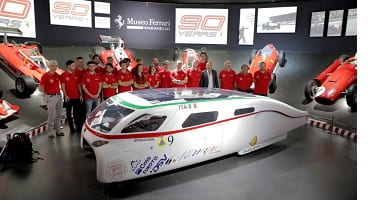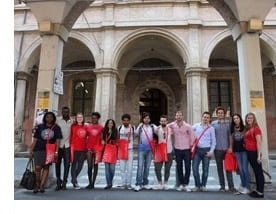 The Cornell-University of Bologna Institute for Vehicle Intelligence “Vĕho” founded by the University of Bologna and Cornell is a shared initiative supporting education and research collaborations between Cornell University/Cornell Tech and selected Italian stakeholders. Vĕho funding will support research initiatives and exchange programs for faculty, students, and industry leaders in the areas of automotive engineering, artificial intelligence, and science of autonomy, to advance their role in future societal impacts and civil infrastructures.
The Cornell-University of Bologna Institute for Vehicle Intelligence “Vĕho” founded by the University of Bologna and Cornell is a shared initiative supporting education and research collaborations between Cornell University/Cornell Tech and selected Italian stakeholders. Vĕho funding will support research initiatives and exchange programs for faculty, students, and industry leaders in the areas of automotive engineering, artificial intelligence, and science of autonomy, to advance their role in future societal impacts and civil infrastructures.
 The Vĕho theme is the advancement of high-performance automotive engineering, with an emphasis on societal impacts and civil infrastructures. This theme will be developed through focused topics such as Advanced Automotive Engineering, Virtual Reality and Computer Graphics, Advanced driver-assistance systems (ADAS), Assisted Mobility, and Autonomy Integration with Transportation and Civil Infrastructures.
The Vĕho theme is the advancement of high-performance automotive engineering, with an emphasis on societal impacts and civil infrastructures. This theme will be developed through focused topics such as Advanced Automotive Engineering, Virtual Reality and Computer Graphics, Advanced driver-assistance systems (ADAS), Assisted Mobility, and Autonomy Integration with Transportation and Civil Infrastructures.
 Vĕho is currently housed in the Italian Academic Center offices in the Tata Innovation Center at the Cornell Tech, located on Roosevelt Island in Manhattan, New York City. Affiliated students, faculty, and industry collaborators will have access to this facility, as well as to participating research laboratories, such as the Real-time Human-Autonomous Systems Collaborations (RealTHASC) facility and the Laboratory for Intelligent Systems and Control (LISC) located at Cornell University, Ithaca, NY. Access to these and other unique facilities will foster academic-industry collaborations, hands-on experience, industry internships, and field work opportunities in a global community.
Vĕho is currently housed in the Italian Academic Center offices in the Tata Innovation Center at the Cornell Tech, located on Roosevelt Island in Manhattan, New York City. Affiliated students, faculty, and industry collaborators will have access to this facility, as well as to participating research laboratories, such as the Real-time Human-Autonomous Systems Collaborations (RealTHASC) facility and the Laboratory for Intelligent Systems and Control (LISC) located at Cornell University, Ithaca, NY. Access to these and other unique facilities will foster academic-industry collaborations, hands-on experience, industry internships, and field work opportunities in a global community.
 Vĕho offers Cornell and University of Bologna students a broad range of exchange programs at both the undergraduate and graduate level. New courses and summer schools will be offered by participating faculty and industry leaders in emerging areas such as human-machine interfaces, assisted mobility, and autonomy. Opportunities for thesis and research projects at participating institutions are designed to promote joint efforts between industry and academia. By offering students and faculty both travel and research support, the institute aims to facilitate pilot research projects, research contracts, as well as entrepreneurship opportunities, such as training and incubator programs.
Vĕho offers Cornell and University of Bologna students a broad range of exchange programs at both the undergraduate and graduate level. New courses and summer schools will be offered by participating faculty and industry leaders in emerging areas such as human-machine interfaces, assisted mobility, and autonomy. Opportunities for thesis and research projects at participating institutions are designed to promote joint efforts between industry and academia. By offering students and faculty both travel and research support, the institute aims to facilitate pilot research projects, research contracts, as well as entrepreneurship opportunities, such as training and incubator programs.
Bologna Photo Credit: Alessandro Arnoldi, Copyright University of Bologna